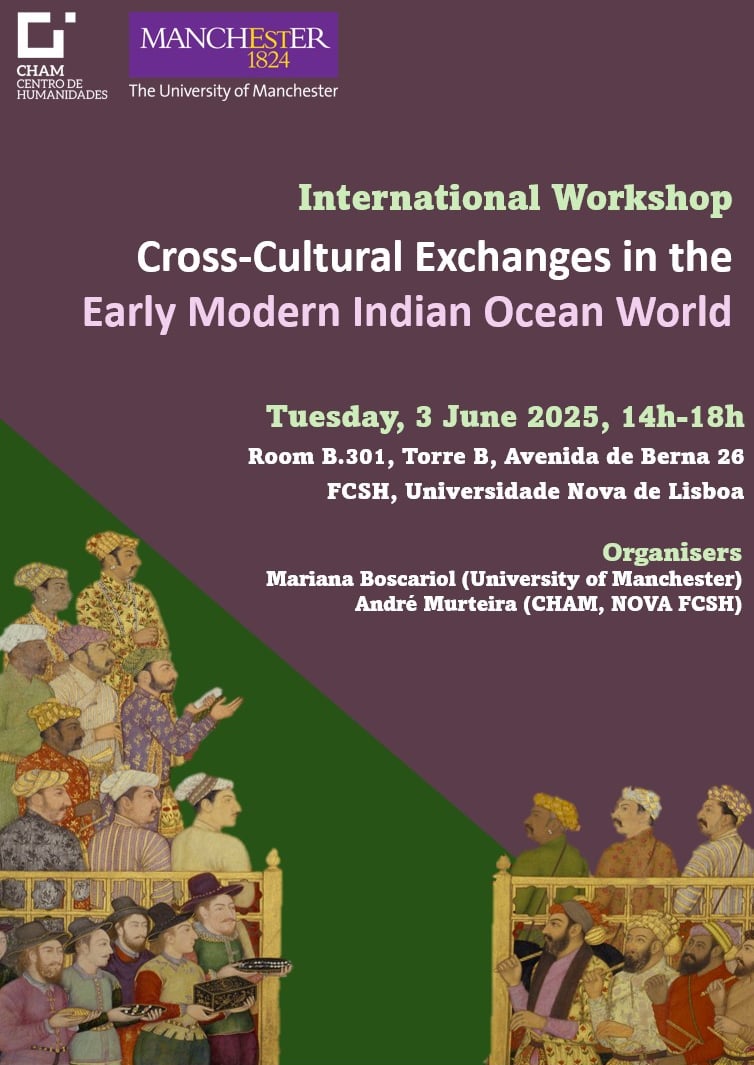Cross Cultural Exchanges in the Early Modern Indian Ocean World
A workshop hosted in collaboration with CHAM as part of the INTRECCI project.
Mariana Boscariol
6/30/20252 min read
"Cross Cultural Exchanges in the Early Modern Indian Ocean World" was the first international workshop of the INTRECCI project. It was generously hosted by CHAM at the Universidade Nova de Lisboa on 3 June 2025, it was organised by Mariana Boscariol and André Murteira (a researcher at CHAM).


A few weeks ago, the International Workshop Cross-Cultural Exchanges in the Early Modern Indian Ocean World brought together Portuguese and foreign researchers to exchange current scholarship on a variety of topics related to South Asia. This event was organised by the project INTRECCI in partnership with CHAM - Centre for the Humanities of NOVA University of Lisbon.
On 3rd June, INTRECCI’s team met the other participants for an afternoon of insightful discussions in Lisbon, at the School of Social Sciences and Humanities of NOVA. The workshop started with a warm welcome by the organisers, Mariana Boscariol (INTRECCI, University of Manchester) and André Murteira (CHAM, NOVA FCSH). Following that, Edmond Smith (Principal Investigator) gave a summary of the project, which helped lay the groundwork for the insightful discussions that would take place in the two panels planed for the day, both chaired by Mariana Boscariol.
The first panel, Archives, Diplomacy and Encounter, started with Pedro Pinto (CHAM, NOVA FCSH) presenting the two decades of the editorial project “Portugal in the Sea of Oman”, a massive and still undergoing collection of documents that include sources from different archives and countries and that span far beyond Portuguese interests; the next speaker, Shounak Ghosh (INTRECCI, Manchester), shared his approach to the Portuguese Estado da India in the sixteenth-century western Indian Ocean through the activity of Mathias de Albuquerque, highlighting how it depended on intense negotiations with Islamicate courts of South Asia that shared a common interest in maritime activities; last presenter was João Teles e Cunha (Instituto de Estudos Asiáticos, U. Católica Portuguesa), who spoke about how entangled histories can be uncovered by a careful and crossed analysis of texts, objects and biographies, from the Portuguese side but not only. The session ended with a 30-minute round of questions that actively counted with the audience, formed by several PhD students and more experienced scholars.
To take up again, the second panel, Empire and Economy, New Research Methods and Approaches, started with Safya Morshed (University of Manchester) presenting her insightful and detailed study which account conflicts, locations, and participants of conflicts that took place in Mughal South Asia between the mid-sixteenth to the early eighteenth century, revealing intriguing patterns; followed by Hélder Carvalhal (Uppsala University), who explored different aspects and approaches to the Portuguese Empire's economic and social history in Asia, presenting exciting data on wellbeing, gender and labour; and André Murteira (CHAM, NOVA FCSH), who finished the day presenting his extensive dataset on Portuguese shipping losses to Dutch privateering in Asia, the result of several years of dedication to the topic.
After another round of intense discussion, most speakers and the INTRECCI’s team continued their conversations during dinner in a traditional Portuguese restaurant, O Poleiro.
In the end of the day, this event was a great opportunity to share and promote undergoing research projects and common interests, being a very positive first visit of the team to Portugal – hopefully one of many!
